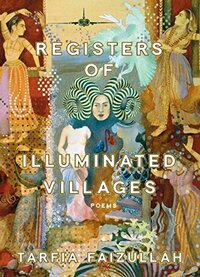Take a photo of a barcode or cover
Read this book for English CW 271. It kept me spellbound in religion, identity, and grief. “The Sacrifice,” “Self Portrait as Mango,” and “Diary,” along with so many other poems, struck a new yet familiar emotional resonance of guilt, self renewal, and appreciation for sacrifice.
The forms (especially ones with received forms) are nothing short of miraculous.
The forms (especially ones with received forms) are nothing short of miraculous.
challenging
emotional
reflective
the last page got me
Minor: Rape
Faizullah grew up in Texas and now teaches writing at a Michigan university. Her family is originally from Bangladesh. She lost a young sister at some point in their childhood and this is included in several poems of loss that are very poignant.
The title refers to villages in Northern Iraq that were completely obliterated with every male killed, leaving behind devastated females to try and survive in disaster zones. Faizullah humanizes what otherwise becomes just a statistic in a record book.
She points to various forms of injustices, from well-meaning Americans who tell her she speaks English very well even though she grew up in Texas to crude Americans who shout for dark-skinned people to 'go home' to their own country.
These are not as angry as some poems on injustice. Rather they are reflective and telling, but with brief bursts of anger inserted.
The title refers to villages in Northern Iraq that were completely obliterated with every male killed, leaving behind devastated females to try and survive in disaster zones. Faizullah humanizes what otherwise becomes just a statistic in a record book.
She points to various forms of injustices, from well-meaning Americans who tell her she speaks English very well even though she grew up in Texas to crude Americans who shout for dark-skinned people to 'go home' to their own country.
These are not as angry as some poems on injustice. Rather they are reflective and telling, but with brief bursts of anger inserted.
Adored this. Lovely verses—imagery rooted in place and the poet’s relationship to place (in this case, Iraq), how that relationship dictates the trajectory of their relationship with others. Though some felt kind of clunky—overly stylized, weak imagery or phrasing just to fit whatever conceit the poem was going for—overall it was a pretty spectacular collection. About borders, connection, language, especially grief—the way it manifests, the way it festers. There’s a lot of loneliness at the heart of this book. A lot of it stems from post-9/11 racism, especially the alienation the author feels as a result of their diasporic status.
This is a poetry collection. It stunned me with how it conveyed the dance of family relationships and obligations without ever quite laying out what is happening. It's a story of grief and, as I am going through my own layers of grief right now, it gave me so much. Loved this: "I knew then/how war was possible/ the urge/ to defy gravity/ to dis-arm another/ I knew then we'd kill. "
emotional
medium-paced
A truly beautiful collection. Faizullah's work is tender and fierce at once as it explores multiple sites of grief and loss, alongside the possibility of healing, of containing the pain alongside life's joys. A smart, big-hearted book. Highly recommend.
there are some very good poems in here, but this collection somehow manages to both require intense concentration and be exceedingly boring, leaving me with no real desire to try to finish it.
emotional
informative
reflective
sad
slow-paced



